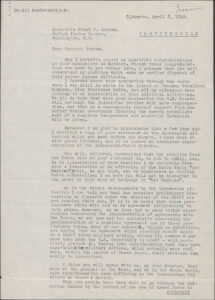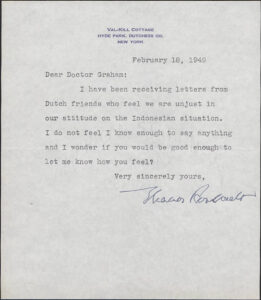Dr. Frank Porter Graham the Diplomat
This is the final page of nine in a virtual exhibition on Frank Porter Graham’s role in negotiations for the recognition of Indonesian independence. See the homepage for the exhibition here. See the previous page here.

After returning to the US in 1948, Dr. Frank resigned as the American representative on the Committee of Good Offices on February 10 and presented his report to the United Nations Security Council on February 17.[1] Nevertheless, he remained involved in diplomatic efforts around Indonesian independence. In January 1949, he wrote a letter to the Acting Secretary of State decrying a recent Dutch military attack on the Indonesian Republican government—in violation of the Renville Agreement—and calling for stronger US action, including through the United Nations.
The violation of the Renville Agreement, the violation of the Security Council cease-fire resolution of August 1, 1947, and the defiance of the United Nations by the present Government of the Netherlands are impairing the democratic foundations of the Western Union, are driving non-communist Asia away from the democratic West and are strengthening the Communist drive in Southeast Asia. Only the leadership of the United States in the United Nations for a bold stand and follow-through can help redeem the situation.[2]
In his activism on the Indonesian case, he even received personal messages from Eleanor Roosevelt, saying that her Dutch friends did not appreciate the American position on the situation.[3]

Around this time, Dr. Frank also left his post at UNC to be appointed to the US Senate in January 1949. (The Indonesian national leadership, then being held in detention on Bangka by the Dutch who had captured them in December 1948, heard about Dr. Frank’s appointment over the radio and later sent him a letter of congratulations.[4]) Serving the remainder of 1949 and 1950, he lost a close Democratic primary run-off to an avowed white-supremacist who denounced Dr. Frank as too liberal. During his brief stint in the Senate, Dr. Frank spoke out about international relations on a number of occasions, including a lengthy statement on the Indonesian conflict in April 1949, which was entered into the Congressional Record. (You can read a full transcript of his statement on Indonesia on our website by clicking this link.) This statement was widely circulated in Indonesia, where it received a strong and positive response. Some newspapers, such as Waspada in Medan, North Sumatra, even undertook to translate and reprint the statement, as a show of US support for the Indonesian position.[5]
Following his defeat in the 1950 Senate campaign, Dr. Frank continued his engagement with international affairs. He served as a board member of the American Association for the United Nations for a decade. His most serious engagement—and one of his lasting legacies as a public figure—was acting as the United Nations Representative in the dispute between India and Pakistan, with a focus on resolving the status of Kashmir. This post, held from 1951 until his full retirement in 1968, took Dr. Frank back and forth to South Asia many times, but he never was able to achieve the same breakthrough success he had on the question of Indonesia’s independence.
[1] Frank Porter Graham Papers, Wilson Library, UNC, box 2088.
[2] Letter from Frank Porter Graham to Acting Secretary of State, the Honorable Robert A. Lovett, January 10, 1949, in Frank Porter Graham Papers, Wilson Library, UNC, box 2156b.
[3] Letter from Eleanor Roosevelt to Frank Porter Graham, February 16, 1949, in Frank Porter Graham Papers, Wilson Library, UNC, box 2156b.
[4] Letter from Dr. Ali Sastroamidjojo to Frank Porter Graham, April 2, 1949, in Frank Porter Graham Papers, Wilson Library, UNC, box 2156b.
[5] Letter from Waspada editor Mohd. Said to Frank Porter Graham, May 20, 1949, in Frank Porter Graham Papers, Wilson Library, UNC, box 2156b.
Further Reading:
Dr. Frank’s diplomatic work receives attention in the many biographies of his life; see these listed among the further reading in the first page of this virtual exhibit. For more on Dr. Frank’s work on the dispute between India and Pakistan, see Robert J. McMahon, Cold War on the Periphery: The United States, India and Pakistan.
